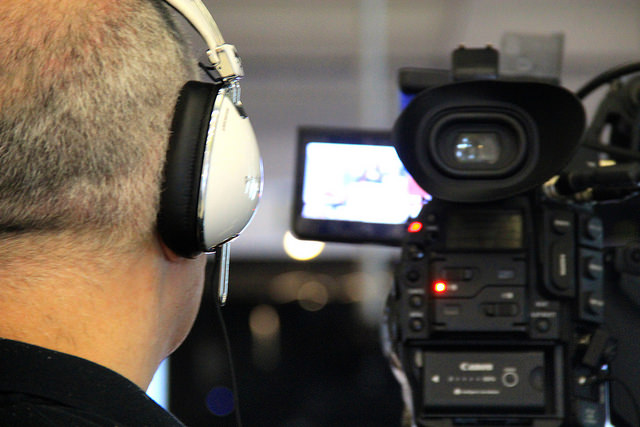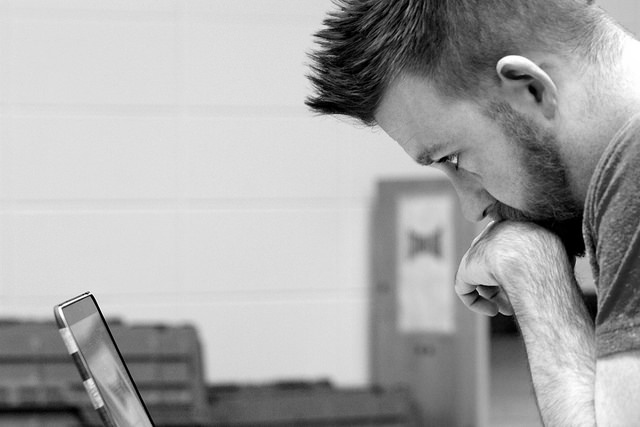
Documenting everything is way of life for Chicago civic tech group

Livestreaming the ADA 25 Chicago launch. The Chicago Community Trust is lead supporter of the event. Photo by Daniel X. O’Neil.
This post is one in a series on what four community and place-based foundations are learning by funding media projects that help to meet their local information needs. All are funded through the Knight Community Information Challenge.
We live in a world of information overload. Conventional wisdom suggests that we’re all so overwhelmed by the super-fast growth of information and data that providers of content must make everything short and succinct.
But in Chicago, a contrarian view is taking shape. For the Smart Chicago Collaborative, which uses and promotes technology to inform people and improve lives, every civic program and event that the organization manages or is involved in is documented comprehensively, in fine detail.
Any project or event that Smart Chicago is involved with (or runs solely) may be:
● Recorded on video or audio, and/or livestreamed;
● Photographed extensively, sometimes to the level of images of every participant;
● Documented in extensive note-taking by one or multiple people;
● Written or blogged about at length, sometimes by multiple “documenters”;
● Tweeted about and/or shared on other social-media platforms;
● Turned into a whitepaper or book (or e-book or PDF report);
● And/or covered using innovative storytelling techniques, such as poetry or sketching.
“We believe that complete documentation, rather than a single home-run blog post, is more valuable,” says Daniel X. O’Neil, executive director of Smart Chicago, which is an arm of The Chicago Community Trust. Knight funds information projects that are run by Smart Chicago.
This is not to say that large audiences are expected to read or view all that detail. “I’m not in it for collecting pageviews,” O’Neil says. The documentation strategy is aimed at assisting and informing, on a deep level, those who are truly interested in a civic topic. Because everything is shared publicly, other organizations (not just in Chicago) can learn exactly how an event or program is run and the lessons learned from it. But the primary goal is to get more Chicagoans to participate in civic affairs. Having them document civic events measurably increases citizen engagement.
Documenting is required for any event. “Publish or perish” is how O’Neil describes the environment at Smart Chicago: “If there’s no blog post (or other form of documentation), it didn’t happen.” And O’Neil, as the organization’s top executive, walks his talk. When he dropped in on a session of this summer’s Youth-Led Tech program recently, for example, he took photos and created a several-minute video about his visit.
Video: Smart Chicago director Daniel O’Neil dropped in on a summer Youth-Led Tech program session and produced a simple video.
Everyone on the Smart Chicago staff documents their own work and publishes it. Much of the documentation has been done by Christopher Whitaker, a consultant who has worked with the organization since 2012; he has blogged about hundreds of civic events and programs, and spent many hours streaming video of civic-innovation events.
Such a deep level of documentation is not possible with just a small staff and some outside consultants, however. Where Smart Chicago’s strategy really ramps up is with its Documenters program, which pays people outside the organization to report on and document civic events. To date, about 50 people have served as Documenters to various civic events.
Headed by director of operations Kyla Williams, the program pays city residents to attend events and document them. The events range from conferences run by Smart Chicago to a meeting of the Chicago City Council. The pay might be $25 for an event or meeting, or $20 an hour in some cases; the documenters often get paid with Visa gift cards. O’Neil estimates that 60% of the documenters are unemployed or under-employed, so the program directly assists those people as well as promotes their involvement in civic life.

Smart Chicago consultant Christopher Whitaker has written some 300 blog posts and produced livestream video for dozens of civic events. Photo by Daniel X. O’Neil.
If a Chicago resident has attended a civic event that’s significant to the community, and documented it in some form, that’s valuable to the community as a whole – especially in an era when fewer journalists are covering public meetings. Also, those residents spread the word about the meetings and events they attend, encouraging other people they know to become engaged and attend civic events, O’Neil says.
By giving some money to motivate attendance at civic gatherings, “People (who otherwise wouldn’t be included) suddenly can become part of that world, and that’s pretty cool,” he says. For any event that Smart Chicago puts on, there’s typically money allotted for documenters.
The problem with many civic gatherings is that the same group of people show up, O’Neil complains. The Documenters program is designed to change that.
Still, recruiting a diverse group of people into the program isn’t simple. O’Neil has tried a number of techniques, including using social media, targeted Facebook ads and reaching out to area journalism educators so they can recruit students to cover civic meetings. The Facebook ads have been the most effective at attracting “more random” applicants to be documenters, but O’Neil and his team are seeking additional innovative ways to recruit beyond the usual suspects.
As to how the documenters cover events, there’s flexibility. O’Neil is a fan of photography and video, because “showing what it’s like to be in a church basement (with Chicagoans) learning about WordPress,” say, sometimes communicates better than a written description. Smart Chicago’s documentation also includes lots of data: the number of people who attended a given civic event; URLs of resources shared; Twitter names of speakers as well as participants; etc. Believing in the value of such quantitative documentation, O’Neil expects to increase it.
And in terms of qualitative documentation of Smart Chicago’s events and programs, that’s fine, too. Take, for example, the event that a documenter covered by sketching. On the second day of the weekend event, the artist even brought along some of her family – demonstrating the program’s ability to indeed expand resident engagement in civic events.
Steve Outing is a writer and digital media consultant.
Recent Content
-
Communitiesarticle ·
-
Communitiesarticle ·
-
Communitiesarticle ·


